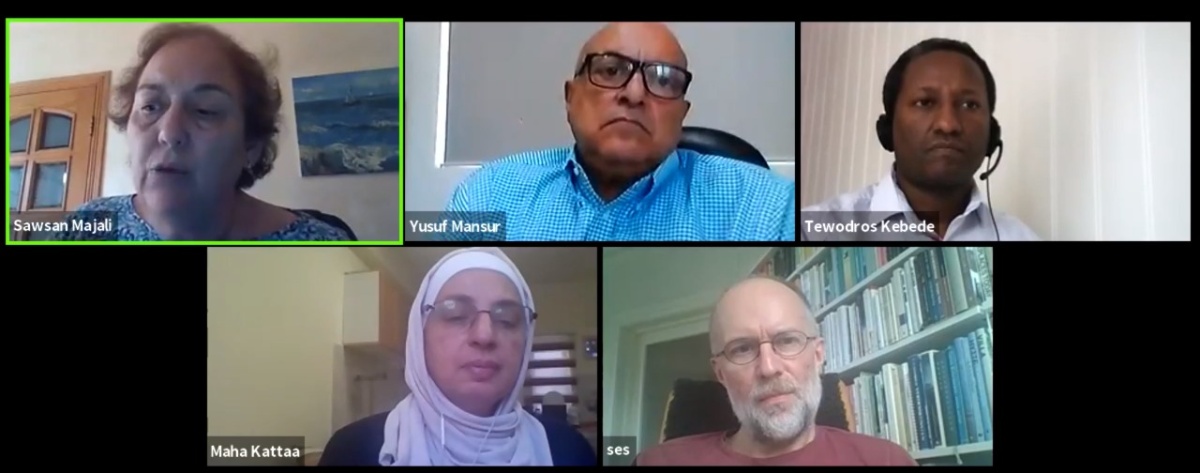“The Pandemic couldn’t have come at a worse time than this. Jordan has witnessed a clear rise in unemployment rates during the past four years, and a deep recession during the past ten years,” Dr. Yusuf Mansur stated during the sixth session of the Arab Renaissance for Democracy and Development’s regional dialogues on social protection policies in the Arab region, which was held on Thursday, May 21, 2020, entitled “Social Protection: Priorities on the National and International Levels.”
“This session aims to shed light on the competing priorities that pertain to responding to refugee crises in the region, as well as the impact of COVID-19 on various communities in the region,” said HE Senator Dr. Sawsan Al Majali, the series moderator as she welcomed the guest speakers HE Dr. Yusuf Mansur Economist and former Jordanian Minister of State for Economic Affairs, Maha Kattaa, International Labor Organization (ILO),Baptiste Hanquart, Jordan INGO Forum (JIF), Svein Erik Stave and Tewodros Aragie Kebede, The Fafo Research Foundation.
Mansur explained the critical Jordanian economic situation, highlighting the loss of GDP by 30% due to the lockdown, with supply chains severely disrupted. According to Mansur, international aid is indispensable as he stressed the importance of uniting the efforts of the local community with the international community, as Jordan hosts a large number of refugees, many of whom work in the informal sector, and very few of whom will be able to secure their livelihood a month from now.
This was confirmed by Dr. Maha Katta, who reviewed the initiative of the International Labor Organization and the Fafo Research Foundation to measure the impact of Covid-19 on the labor market in the region. per Katta discussed the “direct and massive impact”, as Jordan faces a “double” crisis that is a refugee crisis in addition to COVID-19, while Lebanon faces “multiple crises” in addition to the virus, namely challenges related to limited resources and refugees, economic and financial crises.
The important findings of the study, which pertain to individuals from the Syrian refugees and host communities, and startups and small companies in Lebanon and Jordan were further explained by Aragie Kebede and Stave. They shared that the study showed that the crisis led to a large and accelerated reduction in the number of workers who were temporarily or permanently laid off. This has amounted to 47 % of those surveyed who were workers in Jordan, and 86% in Lebanon, being severely impacted and having their households threatened due to their limited resources, as only 70% of them had savings enabling them to secure their livelihood for an additional month. The study showed that one third of the establishments in Jordan has the capability to survives the lockdown for more than one month from now, and that more than 40% of the establishments will not be able to pay salaries next month, as is the case in Lebanon.
The study proposes ILO four policy framework pillars , which include: stimulating the economy andlabor market through a clear financial policy that increases job opportunities, protecting workers in work place (now with release lockdown workers should be protected and feel comfortable going back to work. Can help mitigate risk and crisis),, supporting enterprises work and income through cash packages, in addition to social dialogues aiming to assess policies and propose evidence-based solutions that should include the government, companies and employees to discuss available options and experiences to overcome this crisis. It also proposed that Jordan establishes an Unemployment Emergency Fund.
With regard to social protection, and the role of the international community, and civil society consultations in preparations for the Brussels Conference to be held at the end of June, Baptiste Hanquert said that the role of the Jordan INGO Forum is to ensure that international organizations fulfill their obligations and “make sure that all the cash assistance is distributed during COVID-19 to those who deserve it.” He added that there is an interest in reaching sectors that are eligible for support, in addition to other marginalized groups such as refugees, and that this is being proposed in preparation for the Brussels Conference.
The speakers stressed that this situation represents an opportunity to move forward and develop a national and regional plan, stressing the importance of continuing work towards more localization and ensuring that existing efforts and initiatives targeting refugees and host communities don’t go in vain, but are rather adapted to better respond to this crisis. This should include building on the previous achievements, assessing available resources with the expectation of a lack of funding, and planning more efficiently to reach a holistic and comprehensive response. They also emphasized that government policies, initiatives, and advocacy efforts should be supported by evidence and data to ensure international cooperation, stressing the importance of including women, informal workers, and refugees in the social security system, particularly pointing to Jordan’s response to the crisis in terms of providing assistance to workers. They also recalled the promises Jordan was given during the London Conference regarding international support for refugees, and the need for the international community to fulfill its obligations in this regard.


